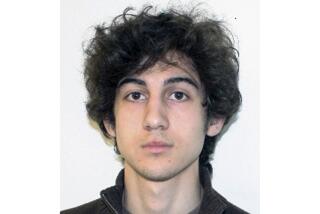9th Circuit bans juror exclusion over sexual orientation
SAN FRANCISCO — A federal appeals court became the first in the nation to rule that prospective jurors may not be excluded because of their sexual orientation, a decision that expands juror protections beyond race and gender and provides legal ammunition to challenge laws that limit gay rights.
The sweeping, unanimous decision Tuesday by a three-judge panel of the U.S. 9th Circuit Court of Appeals overturned a mixed jury verdict in an antitrust case involving an AIDS drug. The 9th Circuit said the case would have to be retried because an obviously gay juror was unjustifiably excluded from the jury.
California state courts already prohibit the striking of jurors based on sexual orientation. Tuesday’s landmark ruling extended the restriction to federal courts in California and courts in eight other Western states, lawyers said.
The decision will also make it harder to justify laws that treat gays differently from others, including bans on same-sex marriage, lawyers said. A challenge to Nevada’s marriage law is already pending in the 9th Circuit, and gays are fighting marriage bans in trial courts in Oregon, Idaho and Arizona.
When a law discriminates on the basis of sexual orientation, it must be closely evaluated to “ensure that our most fundamental institutions neither send nor reinforce messages of stigma or second-class status,” Judge Stephen Reinhardt wrote for the court. The panel said excluding gay jurors violated their constitutional right to equal protection under the law.
Gay rights activists applauded the ruling and predicted that it would help them win marriage rights in other Western states besides California, where same-sex marriage was reinstated last summer.
“This is really a very big deal,” said Jon W. Davidson, legal director of Lambda Legal, a gay rights advocacy group. “It is likely to have a significant impact on other cases.”
David Codell, constitutional litigation director for the National Center for Lesbian Rights, said the decision would make it “exceedingly difficult” for states to justify discriminating against gays in all sorts of contexts.
The ruling came in a lawsuit filed by pharmaceutical company SmithKline Beecham Corp., now GlaxoSmithKline, against Abbott Laboratories. The case involved a decision by Abbott to raise the price of an AIDS drug, a move that infuriated the gay community. A lawyer for Abbott used a peremptory challenge during the 2011 trial to strike a man who had revealed that he had a male partner and had friends with HIV. SmithKline challenged the removal as discriminatory.
The Abbott lawyer said he had “no idea” whether the man was gay but declined to provide another reason for the strike after the trial judge accepted it.
On appeal, Abbott provided several nondiscriminatory reasons for excluding the man, including the fact that he was a computer technician for the 9th Circuit and knew many lawyers. But the 9th Circuit noted that two lawyers were permitted to serve as jurors and called Abbott’s reasons “pretextual.”
After a four-week trial, the jury largely decided in favor of Abbott but awarded GlaxoSmithKline $3.5 million in damages on a contract claim. Abbott appealed the contract award, and GlaxoSmithKline cross-appealed, contending that a new trial was warranted because Abbott unconstitutionally struck a juror based on sexual orientation.
“Jury service is one of the most important responsibilities of an American citizen,” Reinhardt wrote, agreeing with GlaxoSmithKline. “It gives gay and lesbian individuals a means of articulating their values and a voice in resolving controversies that affect their lives as well as the lives of all others.”
The court said that gay and lesbian jurors will not be obligated to reveal their sexual orientation, but if they do, they cannot be struck from a panel because of it. The ruling expanded the protections of a 1986 Supreme Court ruling, Batson vs. Kentucky, that barred peremptory challenges based on race. The prohibition was later extended to gender.
“Permitting a strike based on sexual orientation would send the false message that gays and lesbians could not be trusted to reason fairly on issues of great import to the community or the nation,” wrote Reinhardt, a President Carter appointee who was joined by Judge Mary M. Schroeder, another Carter appointee, and Judge Marsha S. Berzon, a President Clinton appointee.
Lambda’s Davidson said he did not know how often gay prospective jurors were removed, although the issue has arisen in about half a dozen cases across the country. Lawyers are entitled to strike jurors without a reason but must provide a nondiscriminatory explanation if challenged by the other side.
“People have stereotypes,” the gay rights lawyer said. “They think gay people will be liberal or, if it is a police case, may think gay people are against the police. Or a lawyer might think, ‘I just don’t think I will relate well to a gay person on a jury.’ But the point is, the legal system should not be complicit in treating people as not an individual, but as a stereotype.”
Lawyers can often get around the antidiscrimination requirement by providing a neutral reason for a juror’s removal, but “if the real reason is bias, they have to be quick on their feet to come up with another reason, and it has to be consistent with how they treated other jurors,” Davidson said.
A representative for GlaxoSmithKline said the company was pleased with the court’s decision calling for a new trial. Adelle M. Infante, a representative for Abbott, said: “We are reviewing the opinion and evaluating our options.”
Abbott could ask a larger panel of the 9th Circuit to reconsider the case and even take it to the Supreme Court.
More to Read
Sign up for Essential California
The most important California stories and recommendations in your inbox every morning.
You may occasionally receive promotional content from the Los Angeles Times.











